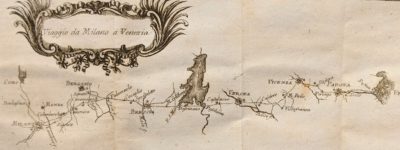Posting People: Postal Services and Early Modern Travel (1550-1720)

FBK Sala riunioni ISIG
Fondazione Bruno Kessler - Polo delle Scienze Umane e sociali
Sala riunioni ISIG
FBK Sala riunioni ISIG
Fondazione Bruno Kessler - Polo delle Scienze Umane e sociali
Sala riunioni ISIG
From their Renaissance outset, early modern postal systems were deeply integrated into hospitality networks and other transit services in Northern Italy. Innkeepers, coachmen, and couriers shared family ties as well as common assets, such as horses and roads. The later seventeenth century brought the postal coach and postal guide, furthering a comprehensive infrastructure for tourism. In this talk, I will show how postal infrastructure became public transportation using administrative archives in combination with printed itinerary books and traveler’s accounts. Postal officials embraced a policy of radical transparency, advertising the reliability and predictability of postal infrastructure over their commercial rivals.
The event will be held in English
In-person event
Scientific coordination:
Massimo Rospocher, FBK-ISIG
Sandra Toffolo, FBK-ISIG
*** Immagine: Biblioteca FBK, D 888228 s-ar 4 B 69
Speakers
-
Rachel Midura - SpeakerRachel Midura is Assistant Professor of Early Modern European and Digital History at Virginia Polytechnic Institute and State University. She is at work on her first book, "Princes of the Post: Power, Publicity, and Europe’s Communications Revolution (1500-1700)" on the origins of Europe's postal systems. Her recent article, "Itinerating Europe," appeared in the Journal of Social History in summer 2021, in which she uses social network analysis to compare conceptions of space in postal itineraries published from the sixteenth through eighteenth centuries. She finished her PhD in early modern European history in 2020 at Stanford University, where she was also a senior graduate research fellow at the Center for Spatial and Textual Analysis.